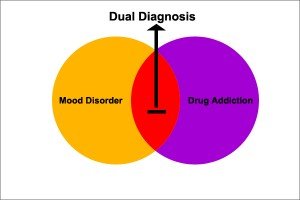Addressing dual-diagnosis individuals is especially challenging for professionals because the symptoms of substance abuse can be confused with symptoms of psychological illness.. It is hard to make a correct initial diagnosis when a person might be exhibiting effects that are actually the result of withdrawal or other effects of chemical dependency. In addition, psychological illness can occur as a result of untreated chemical dependence. With the concurrent multiple challenges present in dual-diagnosis persons, there is no guarantee that treatment will be effective, or productive. The help of dual diagnosis treatment clinics is the best way to insure a chance for successful treatment. Early entry into a program through a dual diagnosis treatment center is ideal.
Mental health professionals who have experience working at dual diagnosis treatment centres are the best equipped to handle the diagnostic challenge of identifying which symptoms come from alcohol or drug use and which are existing psychiatric symptoms. Diagnosis starts with interviews with the person under-going treatment, and that person’s friends and loved ones. The insight gleaned from interviews assists doctors in beginning diagnosis. Extensive interviews are followed with intensive evaluation of the client’s behaviors, in an attempt to identify in what ways drug or alcohol use might be effecting everyday life. It is also crucial to look at any negative outcomes that a potentially dual-diagnosed person’s alcohol or drug use has on work, school, family and friends. An exploration of family history to find any ancestors with chemical dependency or psychological problems proceeds from interviews and evaluation of behavior.

Despite the intimidating problems and many snares associated to dual-diagnosis, sufferers at dual diagnosis treatment centres can receive beneficial treatment and the symptoms of dual-diagnosis can be managed. The first step is eliminating substance use. A client must be treated of the symptoms of intoxication and withdrawal before psychological complications can be addressed effectively. Once sobriety is maintained, dual diagnosis treatment centers can initiate treatment for the mental health complications the dual-diagnosis client is troubled with. Treatment by mental health experts can incorporate psychotherapy and medicine. By addressing sleep and stress management, and offering individual and group therapy, doctors will help the patient deal with mental health complications. These endeavours on the part of psychiatrists, in addition to aid from best friends and family, will encourage healing from psychiatric and addictive problems.
In addition to the primary problems of their dual-diagnosis, there are often medical issues resulting because of drug use that need to be taken care of before treatment can commence. Those who need treatment are often impaired or in crisis and lack the voice to reach out to the people who can help them. They are very often without support because of conflict with loved ones, or lacking resources because of unemployability. Insufficient funds can make it very troublesome to think about signing up at a dual diagnosis treatment clinic. The most intimidating problem when attempting to treat dual-diagnosis is that affected people are very often unable to ask for help or seek treatment on their own.
Friends and family don’t know what to do when they attempt to help their loved ones suffering from dual-diagnosis. Every attempt to help seems to wind up in a disaster and only make things worse. They feel ashamed as their efforts to better the lives of their dual-diagnosed family lead to strong feelings of hopelessness. However, there are things that family members can do to help. First, friends and relations need to ensure that they’ve done all things possible to realize what their loved ones are facing and that they’ve done all things available to help themselves before seeking to help their loved one with the complex and perplexing issues of dual-diagnosis. Friends can look for behaviors that may be a signal of relapse and assist their loved ones participate in treatment. It is often close friends and family members who are important in getting a person with dual diagnosis into dual diagnosis treatment clinics. When someone with dual-diagnosis doesn’t have the ability to enter a treatment center, the assistance of friends and family often is the thing that assists them as they get control of their life.
